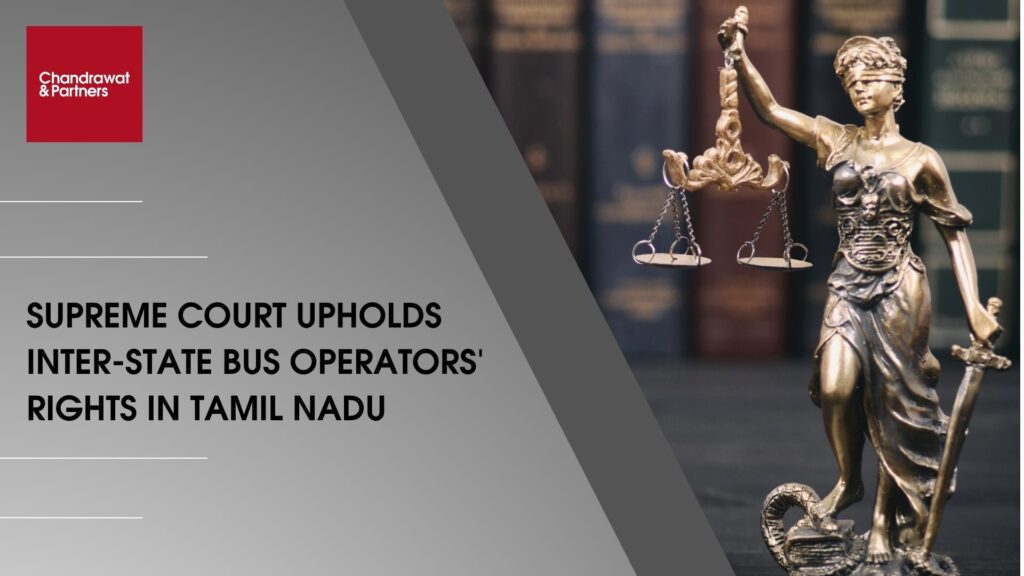
Share :
SUPREME COURT UPHOLDS INTER-STATE BUS OPERATORS’ RIGHTS IN TAMIL NADU
The Supreme Court of India has issued an interim order directing the Tamil Nadu government not to obstruct buses registered in other states that hold an All-India Tourist Permit (“AITP”). This decision is significant as it addresses ongoing disputes between state authorities and interstate bus operators, ensuring seamless movement of interstate buses across Tamil Nadu.
THE CASE BACKGROUND
In the case of KR Suresh Kumar & Ors. Versus State of Tamil Nadu & Ors. the conflict arose when the Tamil Nadu government issued directives requiring interstate bus operators to register their vehicles with local Regional Transport Offices (RTOs) within the state. This mandate aimed to ensure that buses passing through Tamil Nadu were locally registered, ostensibly to curb revenue losses from road taxes. The Tamil Nadu Transport and Road Safety Commissioner reinforced this requirement in a press release dated June 18, 2024, which specifically targeted buses registered in Nagaland. According to the state, many operators registered their buses in Nagaland to avoid the higher registration charges in Tamil Nadu.
PETITIONERS’ ARGUMENT
The petitioners, (interstate bus operators) challenged the directives. They argued that their buses often need to traverse Tamil Nadu due to the geographical layout of Kerala and the National Highway system. Therefore, the state’s requirement for re-registration posed significant operational hurdles.
They highlighted a prior Supreme Court order from December 15, 2023, which had allowed interstate bus operators to pass through Tamil Nadu without obstruction. This precedent was presented to strengthen their case against the latest mandate by the Tamil Nadu authorities. The petitioners emphasized that such repetitive restrictions not only hinder their operations but also contravene the purpose of the AITP, which is to facilitate smooth interstate travel.
SUPREME COURT’S INTERIM ORDER
In response to the plea, a vacation bench comprising Justices BV Nagarathna and Ujjal Bhuyan issued an interim order in favour of the petitioners. The Court stated unequivocally that there should be no hindrance or obstruction to the movement of buses with AITP within Tamil Nadu. This order effectively suspended the state’s directive requiring re-registration of interstate buses. The Court’s decision underscores the importance of maintaining the spirit of the AITP, which is designed to promote uninterrupted interstate travel for tourist buses. By affirming this principle, the Supreme Court has provided much-needed relief to the petitioners, allowing them to continue their operations without the additional burden of re-registration.
IMPLICATIONS OF THE RULING
This ruling has significant implications for interstate bus operators and state authorities alike. For the operators, it ensures operational continuity and reduces administrative burdens. They can now transit through Tamil Nadu without fear of non-compliance with state-specific registration requirements, as long as they possess a valid AITP. For the Tamil Nadu government, the ruling highlights the need to balance state revenue interests with the broader legal framework governing interstate travel. The state’s rationale for enforcing local registration requirements was primarily to address revenue losses due to lower road tax collections. However, the Supreme Court’s order underscores that such measures must align with national policies and permits designed to facilitate interstate commerce and travel.
LOOKING AHEAD
While the interim order provides immediate relief to interstate bus operators, the final resolution of this legal dispute will depend on further hearings and a comprehensive judgment by the Supreme Court. Both parties will likely present additional arguments and evidence to support their positions. The case also draws attention to broader issues of federalism and the harmonization of state and national policies. The Supreme Court’s intervention in this case serves as a reminder of the judiciary’s role in upholding national unity and economic integration through fair and consistent application of the law.
ANALYSIS
The Supreme Court’s interim order against the Tamil Nadu government’s directive marks a significant step in protecting the rights of interstate bus operators. By reinforcing the validity of the All-India Tourist Permit, the Court has ensured that buses can move freely across state borders, fostering greater connectivity and economic activity. This case underscores the ongoing need for a balanced approach that respects both state autonomy and national interests in India’s federal system.
For more information or queries, please email us at
[email protected]



